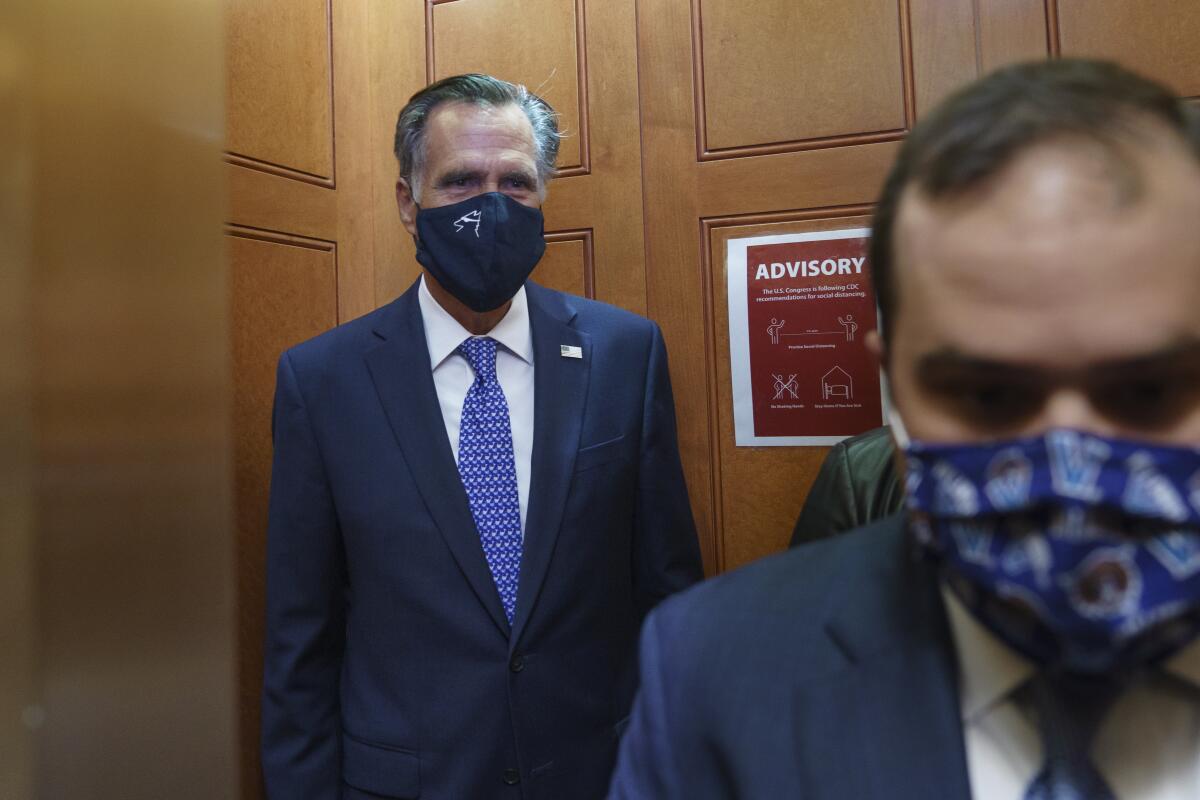Republicans secure support to act on Supreme Court vacancy as Romney falls in line

- Share via
WASHINGTON — Senate Republicans have enough votes to consider and likely confirm President Trump’s Supreme Court nominee after Utah Sen. Mitt Romney said on Tuesday the president has the right to replace Justice Ruth Bader Ginsburg even as the presidential election is underway in some states.
Romney was one of the last Republican holdouts to announce whether he would consider voting for a Trump nominee, despite Senate Republicans’ refusal nine months before the 2016 election to consider President Obama’s nomination of Merrick Garland after the death of Antonin Scalia.
Trump said he would announce his selection — he said it would be a woman — on Saturday.
Republicans said they would decide whether to vote ‘yes’ based on her qualifications. But with Senate Majority Leader Mitch McConnell holding 51 votes from Republicans eager to put another conservative on the high court, regardless of the election, confirmation is viewed as most likely barring a disqualifying surprise.
Only two Republicans — Sens. Lisa Murkowski of Alaska and Susan Collins of Maine — have said they will not consider supporting a nominee before election day, Nov. 3. Two more Republicans would have had to defect for Democrats to have a realistic chance of blocking Trump’s nominee.
Republican leaders have not yet announced if the vote would be held before or after the election and suggested that decision would be made once a confirmation hearing is held.
Sen. Lindsey Graham (R-S.C.), the chairman of the Senate Judiciary Committee, said Monday on Fox News that he expected a preelection vote. “We’ve got the votes to confirm the judge, the justice, on the floor of the Senate before the election,” he said, “and that’s what’s coming.”
On Tuesday, he said he expected to hold a confirmation hearing. Earlier, Trump had retweeted a report that conservative broadcaster Rush Limbaugh called for the Senate to skip a hearing to hasten a vote.
A hearing would all but certainly command wall-to-wall television coverage in the weeks before November. Sen. Kamala Harris (D-Calif.), the Democrats’ vice presidential nominee, is a member of the Senate Judiciary Committee. Her prosecutorial questioning of witnesses in prior hearings, including that of Supreme Court Justice Brett M. Kavanaugh, made her a favorite of progressives.
Rank-and-file Republicans are conflicted on the timing of the vote, according to Sen. John Thune of South Dakota, the No. 2 Senate Republican. A preelection vote has advantages for Republicans: Senate leaders typically want to hold a vote as quickly as possible once it is clear that they have enough support. And few issues excite their party’s voters as much as filling court seats with conservatives. This year, however, in an unusual twist, polls have shown that more Democrats than Republicans view the court’s makeup as important to their vote.
Democrats on Tuesday confronted the fact that there is little they can do to block the nomination.
“I’ve been around here a few years. You can slow things down but you can’t stop them,” said Sen. Richard J. Durbin of Illinois, the No. 2 Senate Democrat. “There comes a point — we use whatever tools we have available, but ultimately there will be a vote.”
Senate Minority Leader Charles E. Schumer (D-N.Y.) has warned that “nothing” would be off the table in 2021 if Republicans move ahead and Democrats win a majority in November; party activists are calling for expanding the court if Joe Biden is elected. He added that McConnell would “destroy” the Senate if the GOP moved ahead.
“Leader McConnell has defiled the Senate like no one in this generation,” Schumer said. “Leader McConnell may very well destroy it. If Leader McConnell presses forward, the Republican majority will have stolen two Supreme Court seats four years apart, using completely contradictory rash analyses,” he added — a reference to Republicans blocking Garland’s nomination throughout a presidential election year.
In a sign of the deeply partisan nature of the debate, Republicans prevented Democrats from passing a nonbinding Senate resolution to honor Ginsburg. Sen. Ted Cruz (R-Texas) blocked the resolution, blaming Democrats for adding language citing Ginsburg’s dying wish that her seat not be filled until a new president is in place.
Joe Biden, if he wins the White House, will have the most experience with the federal courts of any president in modern times.
Republicans view the vacancy as a once-in-a-generation opportunity to cement a conservative majority on the court, a point Romney made to reporters in the Capitol on Tuesday. They are moving with remarkable speed to confirm a sixth Republican-appointed justice for the nine-member high court, even before Trump has named his choice.
“My liberal friends have over many decades gotten very used to the idea of having a liberal court. And that’s not written in the stars,” he said. “I know a lot of people are saying, ‘Gosh, we don’t want that change.’ I understand the energy associated with that perspective. But it’s also appropriate for a nation which is, if you will, center-right, to have a court which reflects a center-right points of view.”
Like other Republicans, Romney said in a statement Tuesday that he thought it was fair to consider a nominee now because the White House and Senate are controlled by the same political party, which was not the case in 2016.
“The historical precedent of election year nominations is that the Senate generally does not confirm an opposing party’s nominee but does confirm a nominee of its own,” Romney said. “Accordingly, I intend to follow the Constitution and precedent in considering the president’s nominee. If the nominee reaches the Senate floor, I intend to vote based upon their qualifications.”
Trump said five women were being vetted for the nomination to replace Ginsburg, who died Friday, “but I have one or two that I have in mind.”
According to Republicans familiar with the selection process, two conservative federal appeals court judges, Amy Coney Barrett and Barbara Lagoa, are the only candidates in real contention.
More to Read
Get the L.A. Times Politics newsletter
Deeply reported insights into legislation, politics and policy from Sacramento, Washington and beyond. In your inbox three times per week.
You may occasionally receive promotional content from the Los Angeles Times.












